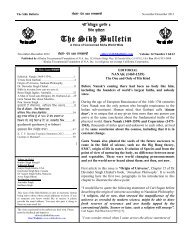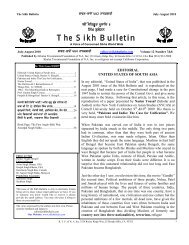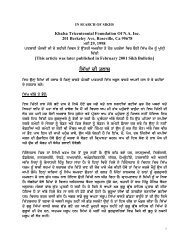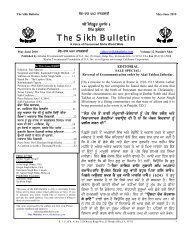You also want an ePaper? Increase the reach of your titles
YUMPU automatically turns print PDFs into web optimized ePapers that Google loves.
<strong>The</strong> <strong>Sikh</strong> <strong>Bulletin</strong> cyq-vYswK 539 March-April 2007<br />
kaadhee koorr bol mal khaae || braahaman naavai jeeaa<br />
ghaae ||<br />
jogee jugath n jaanai a(n)dhh || theenae oujaarrae kaa<br />
ba(n)dhh || GGS page662<br />
<strong>The</strong> Qazi tells lies and eats filth; the Brahmin kills and then<br />
takes cleansing baths.<br />
<strong>The</strong> Yogi is blind, and does not know the Way. <strong>The</strong> three of<br />
them devise their own destruction.<br />
Guru Nanak’s philosophy of social revolution and universal<br />
brotherhood focuses on purity of life. He says:-<br />
sachahu ourai sabh ko oupar sach aachaar || GGS page 62<br />
Truth is higher than everything; but higher still is truthful<br />
living.<br />
<strong>The</strong> philosophy of Guru Nanak for a social revolution and<br />
universal brotherhood is relevant more than ever before.<br />
Guru Nanak set out to revolutionize the world and empower<br />
the powerless by identifying himself with the downtrodden.<br />
He writes:- GGS page 15<br />
neechaa a(n)dhar neech jaath neechee hoo ath neech ||<br />
naanak thin kai sa(n)g saathh vaddiaa sio kiaa rees ||<br />
Nanak seeks the company of those who are of low caste<br />
among the lowly, nay rather lowest of the low. Why should<br />
he rival the lofty<br />
He refused to recognize the man-made distinctions of<br />
religion, caste and creed. His slogan that there is no Hindu<br />
and no Musalman implied that he refused to accept any<br />
discrimination between man and man. His idea of fatherhood<br />
of God and brotherhood of man became the bedrock of his<br />
revolutionary teachings. He started the practice of ‘Pangat<br />
and Sangat’, not hitherto practiced. This created a deep<br />
impact on the people of all castes. This was a thing<br />
unimaginable in the traditional Hinduism and those<br />
belonging to higher castes called him misguided and mad.<br />
koee aakhai bhoothanaa ko kehai baethaalaa ||<br />
GGS page 991<br />
Some say poor Nanak is a spirit. Some say that he is a<br />
demon.<br />
His revolutionary nature elevated the masses and installed in<br />
them an honorable philosophy of life through a simple<br />
dictum” Kirat Karo, Vand Chhako and Naam Japo” Earn<br />
your livelihood by honest creative labor, share the fruit of<br />
your labor with others and practice the discipline of Naam.<br />
He undertook four long journeys to propagate his<br />
revolutionary ideas among the masses. His method was nonaggressive,<br />
practical and dramatic which worked like magic<br />
Worshippers at Hardwar realized the futility of their practice<br />
without any lengthy discussion. His refusing the invitation of<br />
Malik Bhago and accepting that of Bhai Lalo made him a<br />
popular revolutionary. He brought a wonderful change in the<br />
life of Sajjan, a notorious robber, by uttering a few words.<br />
He preached and practiced simple living and high thinking.<br />
He insisted on the life of a house-holder and did not like<br />
renouncing the world. His revolutionary teaching elevated<br />
the masses and installed in them an honorable philosophy of<br />
life. He says:-<br />
aas niraasee tho sa(n)niaasee || GGS page 356<br />
He who controls his desires becomes a true renouncer.<br />
Like a true revolutionary, he glorified womanhood and<br />
said:-<br />
so kio ma(n)dhaa aakheeai jith ja(n)mehi raajaan ||<br />
GGS page 473<br />
Why call her bad, from whom are born kings.<br />
He preached against the bad customs and rituals; and<br />
condemned them in his writings. He advised us not to<br />
quarrel over our eating habits and said:-<br />
maas maas kar moorakh jhagarrae giaan dhhiaan nehee<br />
jaanai || GGSpage 1289<br />
<strong>The</strong> foolish ones quarrel over flesh and don’t know about<br />
wisdom and meditation.<br />
He was a great revolutionary who advised people to worship<br />
one God and not to worship idols. He says:-<br />
paathhar lae poojehi mugadhh gavaar ||<br />
<strong>The</strong> ignorant fools worship stones.<br />
Sawan Singh Gogia, USA<br />
*****<br />
GOD OF KRISHANAVTAR<br />
Gurtej Singh, Chandigarh<br />
<strong>The</strong> word ‘god’ appearing in the heading above is used in<br />
the sense of ‘ishat’ or ‘aradhya dev’ the two commonly<br />
used terms in the Indian religious terminology.<br />
Krishanavtar is a voluminous writing running into more<br />
than 790 pages of a recent recension of the dasamgranth.<br />
(Rattan Singh Jaggi and Gursharan Kaur Jaggi, Sri<br />
Dasamgranth Sahib, vol. ii, Gobindsadan, New Delhi,<br />
1999). It accounts for the major part of the Chaubis Avtar<br />
(Twenty-four Incarnations), which in turn constitutes the<br />
Bacittarnatak Granth. <strong>The</strong> exercise became necessary<br />
because of the assertion of a particular set of writers that the<br />
book has been written by Guru Gobind Singh. On the face<br />
of it the effort appears unnecessary because on almost every<br />
page of the book, the name of the author is mentioned more<br />
than once according to a practice prevalent among oriental<br />
poets. Most of the book appears to have been written by one<br />
Shyam with certain passages of it having been composed by<br />
Ram and possibly another person. Religious beliefs of the<br />
author and the purpose for which he wrote the book may<br />
help in determining or ruling out the Guru’s authorship.<br />
Guru Gobind Singh was the tenth successor to Guru Nanak<br />
with whom he is doctrinally presumed to be identical in<br />
word and thought. He is also the one who finalised the <strong>Sikh</strong><br />
scripture Guru Granth Sahib and gave strict instructions to<br />
regard it as the ‘living Guru.’ Almost with his last breath he<br />
instructed his followers to ‘worship Akal, to take religious<br />
directions from the Guru Granth, to look upon the Khalsa as<br />
the ideal human form and to ever seek the welfare of all<br />
K. T. F. of N. A. Inc. 3524 Rocky Ridge Way, El Dorado Hills, CA. 95762 3
















